
Car accidents happen for many reasons. A driver might follow too closely and rear-end another vehicle when it hits traffic congestion. Or someone might take a corner a little too fast during a rainstorm and slide into another vehicle. Occasionally, a crash will result from bad brakes or worn tires.
Collisions due to vehicle faults are rare, but they are often preventable. Unfortunately, there are no longer any mandatory car inspection laws in Colorado.
After a crash in Lakewood, CO, a lawyer from Matos Personal Injury Lawyers can determine whether a vehicle fault might have played a role in it and whether anyone acted negligently. Call our law office at (720) 912-7274 for a free initial consultation to learn more.
How Matos Personal Injury Lawyers Can Help You After a Car Accident in Lakewood, CO

Matos Personal Injury Lawyers was founded in 2016 to help injured people in Lakewood, Colorado seek compensation from those responsible for their injuries. Our Lakewood car accident lawyers provide strong and fearless representation for injured victims just like you.
If you suffer an injury in an auto accident caused by someone else’s negligent or intentional actions, our attorneys will provide the following:
- A free case review so we can learn about your situation and explain your options
- Preparation of your insurance claim and aggressive negotiations to try to resolve it
- Over 39 years of combined experience fighting in court against parties who refuse to settle
Car accidents can happen for many reasons, including defective equipment. Contact our Lakewood personal injury lawyers to discuss your car accident injuries and who you can pursue for compensation.
How Many Lakewood Crashes Result From Dangerous or Defective Vehicles?
Lakewood had 2,227 traffic crashes in 2023, according to a search using the Colorado Crash Data Dashboard.
These crashes included:
- 531 single-vehicle crashes
- 59 pedestrian accidents
- 31 bicycle accidents
The remaining 1,606 crashes involved collisions between two or more motor vehicles. These multi-vehicle collisions had a variety of causes.
The three primary accident causes include:
- Driving errors, such as speeding or tailgating
- Environmental causes, such as slick roads or glare
- Equipment failures, such as tire blowouts and failed brakes
According to a landmark study by the National Highway Traffic Safety Administration (NHTSA), driving errors cause about 94% of crashes, environmental factors cause about 2%, and equipment failures cause about 2%. The remaining 2% happen due to other or unknown reasons.
You can estimate the number of crashes in Lakewood that may have resulted from equipment failures or defective vehicles by applying the NHTSA’s 2% number to the dashboard’s crash totals. Based on this calculation, you can estimate that about 32 of the city’s crashes arose from a vehicle-related cause.
Vehicle Safety Inspections in Colorado
The National Traffic and Motor Vehicle Safety Act of 1966 set many standards we now take for granted. This act touched on many issues, including speed limits, motorcycle helmets, and vehicle safety inspections. Specifically, the act empowered the U.S. Secretary of Transportation to withhold highway funding from states that failed to implement the act’s standards.
In 1975, states reached a high-water mark for vehicle safety inspections. Thanks to the threat of losing highway funding, 31 states plus Washington D.C. required regular inspections, typically annual or biennial, for vehicle owners to receive their registration certificates.
But these requirements almost immediately waned when Congress withdrew the Secretary’s authority to withhold highway funding. By 2016, only 15 states still required regular vehicle safety inspections.
Colorado is not one of these states. Stated differently, Colorado does not require regular vehicle safety inspections. It does require vehicle emissions inspections. However, these inspections do not arise from safety concerns. Instead, they arise from concerns about air pollution.
Spot Inspections
Although Colorado does not require regular inspections, dangerous and defective vehicles do not clog its roads. The state has laws setting equipment standards for vehicles.
For example, vehicles on Colorado’s roads must have:
- Functioning brakes on at least two wheels
- Mirrors that give a view of at least 200 feet behind the vehicle
- Brake lights and turn signals
Police officers can stop vehicles when they have reasonable cause to believe their equipment does not meet the state’s standards. During this stop, an officer can conduct a spot inspection to examine or even test the equipment to determine compliance.
Liability For Lakewood Crashes Caused By Faulty Vehicle Equipment
Drivers may be liable for crashes that occur when their vehicles malfunction. Negligence happens when someone fails to exercise reasonable care. If a driver notices that their vehicle is not functioning properly, the driver may have a legal duty to fix the vehicle to ensure it does not pose a safety hazard.
Other parties may bear liability for crashes caused by equipment failures. If the vehicle left its manufacturer in a defective condition, the owner may have a product liability claim against them. Similarly, a driver may have a claim against a service garage for any negligently performed repairs.
Schedule a Free Consultation With Our Skilled Lakewood Car Accident Attorneys
You can trace the primary cause of a car accident to many sources, including vehicle defects. Contact Matos Personal Injury Lawyers at (720) 912-7274 for a free consultation to discuss the causes of your crash and who may bear legal liability for your injuries.
